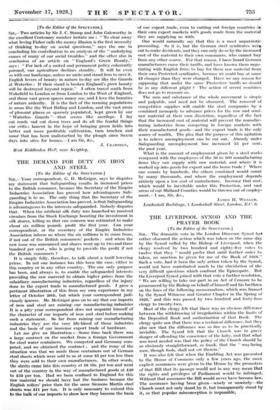THE DEMAND FOR DUTY ON IRON AND STEEL [To the
Editor of the SPECTATOR.]
Sin,—Your correspondent, G. D. McGrigor, says he disputes my statement that Safeguarding results in increased prices to the British consumer, because the Secretary of the Empire Industries Association has proved how advantageous Safe- guarding is to us. The only thing that the Secretary of the Empire Industries Association has proved, is that Safeguarding is advantageous to the interests safeguarded. Nobody disputes that. When the artificial silk duty was launched we received circulars from the Stock Exchange boosting the investment in silk shares, telling us that one concern was estimated to make about six million pounds profit the first year. Can your correspondent, or the secretary of the Empire Industries Association inform us where the six millions is to come from, if not out of the British consumers' pockets ; and when the new issue was announced and shares went up to two and three hundred per cent., who is going to provide the profit if not the British consumers ?
It is simply folly, therefore, to talk about a tariff lowering prices. In not one instance has this been the case, either in this country or in any other country. The one only purpose has been, and always is, to enable the safeguarded interests providing the raw material to obtain higher prices from the subsidiary manufacturing industries, regardless of the injury done to the export trade in manufactured goods. I gave a pertinent illustration of this from my own experience in my letter of October 20th, but which your correspondent judi- ciously ignores. Mr. McGrigor goes on to say that our imports of–iron and steel are ruining our manufacturing industries It is a pity your correspondent does not acquaint himself of the character of our imports of iron and steel before making such a statement. So far from ruining our manufacturing industries they are the very life-blood of those industries and the basis of our immense export trade of hardware.
• Let me give an illustration :—Some time back there was a large contract on the market from a foreign Government for steel water containers. We competed and Germany com- peted, and we obtained the contract ; and the irony of the situation was that we made those containers out of German steel sheets which were sold to us at some £3 per ton less than they were sold to their own manufacturers. In other words, the sheets came into this country at £8 10s. per ton and went out of the country in the way of manufactured goods at £40 to £50 per ton. Had we been confined to England for this raw material we should have lost -the business because the English rollers' price then for the same Siemens Martin steel sheets was £11 per ton. It is only necessary to extend this to the bulk of our imports to show how they become the basis
of our export trade, even to cutting out foreign countries in their own export markets with goods made from the material they are supplying us with.
One would naturally say that this is a most unpatriotic proceeding. So it is, but the German steel syndicates were out to make dividends, and they can only do so by the increased cost of the material to their own. consumers, who cannot buy from any other source. For that reason, I have heard German manufacturers curse their tariffs, and have known them nego- tiating with English firms to buy for them raw material from their own Protected syndicates, because at could buy at some £3 cheaper than they were charged. Have we any reason for supposing that under the same Protective tariffs we should be in any different plight ? The action of recent combines does not go to reassure us.
The sum and substance of the whole movement is simple and palpable, and need not be obscured. The removal of competitive supplies will enable the steel companies by a combined monopoly to advance prices for the raw and semi- raw material at their own discretion, regardless of the fact that the increased cost of material will prevent the manufac- turing industries from competing in foreign markets with their manufactured goods—and the export trade is the only source of wealth. The plea that the purpose of this agitation is to relieve unemployment can be cut out. Already under Safeguarding unemployment has increased 25 per cent. the past year.
Whit is the amount of employment given by a steel works compared with the employees of the 50 to 100 manufacturing firms they can supply with raw material, and where it is worked up into goods for export and the home trade ? Where one counts by hundreds, the others combined would count by many thousands, and where the employment depends entirely upon a low cost of manufacture. Increase that cost, which would be inevitable under this Protection, and vast areas of our Midland Counties would be thrown out of employ- ment.—I am, Sir, &c., JAMES IL WEAGER. Leadenhall Buildings, 1 Leadenhall Street, London, E.C. 8.






































 Previous page
Previous page